Contrast – Review
by Ric
|
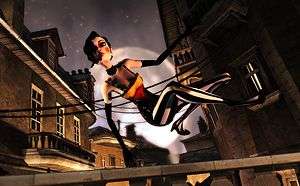 There are some games in the world that you see once, for just a few minutes, and they remain with you forever. Something about them sticks in your mind permanently, and you can’t help but think of them from time to time, wondering how development is going, hoping all is well. I saw plenty of such games at Gamescom this year, but few remained truly lodged in my brain like Contrast. Its distinct style and slick soundtrack burned its way into my brain, and I couldn’t wait to get my own grubby mitts on it to finally see if it was as fun to play as it was to look at. And recently, I did just that.
There are some games in the world that you see once, for just a few minutes, and they remain with you forever. Something about them sticks in your mind permanently, and you can’t help but think of them from time to time, wondering how development is going, hoping all is well. I saw plenty of such games at Gamescom this year, but few remained truly lodged in my brain like Contrast. Its distinct style and slick soundtrack burned its way into my brain, and I couldn’t wait to get my own grubby mitts on it to finally see if it was as fun to play as it was to look at. And recently, I did just that.
Developed by first-timers Compulsion Games, Contrast puts you in the shoes of Dawn, imaginary friend to the adorable DiDi, who has a habit of sneaking out of the house at night while her mother, Kat, performs at the cabaret. Since you’re an imaginary friend, no one but DiDi can see you, but more interesting is that you can’t see anyone else either; instead, every character other than DiDi is seen only through their shadows. It’s an incredibly bizarre and initially jarring style choice, particularly when DiDi interacts with people who, in your eyes, aren’t really there, but it’s a fascinating design decision that fits neatly into the story and provides a novel twist on what would otherwise be fairly standard cutscenes.
The story is probably one of the strongest areas, although it tends to meander and shift in tone a little too much to be truly amazing. The first act is wonderfully noir in style, complete with deadbeat dads, mobsters and sleazy hotel liaisons, and slides seamlessly between steamy cabaret numbers to heart-wrenching tales of a family falling apart. The second act loses its way slightly, instead becoming somewhat silly and tasking you with fixing a fairground, but it’s still wonderfully written and there are some laugh-out-loud moments within. Act three is where everything just goes weird and fantastical, and when you consider it only takes a few hours to reach this point, it’s kind of incredible to see how far gone the plot ends up in such a short space of time. Yet it still works within its own context; the problem is that it jars with the rest of the plot. What you end up with is one story that seems to be written by three different people who couldn’t agree on a tone. They all work, and there is one key plot thread, but the components just don’t quite gel as well as they could.
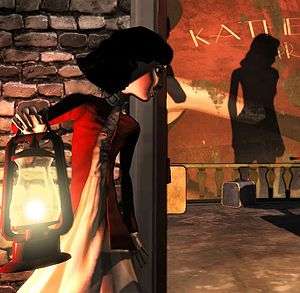 But the characters that exist within the story are so well written that it’s relatively easy to forgive the tonal shifts. Jimmy, DiDi’s father, is your average down-on-his-luck guy who’s done some time behind bars and is fighting desperately to win his family back at any cost. Kat, who appears at times to be a neglectful mother, is quietly a very broken and depressed woman, but you only see this in some of the collectibles found around the world, such as a particularly upsetting note being drafted to child services begging for them not to take DiDi away. These little scraps of story are hidden away, and if you blaze through the game without looking hard enough then you’ll miss out on some of the deeper and more emotional parts of the game, which would be a real shame. It’s wonderfully written with likeable and believable characters, and if the three acts had followed one style rather than flitting between serious and silly, this would’ve been one of the best-written games of the year.
But the characters that exist within the story are so well written that it’s relatively easy to forgive the tonal shifts. Jimmy, DiDi’s father, is your average down-on-his-luck guy who’s done some time behind bars and is fighting desperately to win his family back at any cost. Kat, who appears at times to be a neglectful mother, is quietly a very broken and depressed woman, but you only see this in some of the collectibles found around the world, such as a particularly upsetting note being drafted to child services begging for them not to take DiDi away. These little scraps of story are hidden away, and if you blaze through the game without looking hard enough then you’ll miss out on some of the deeper and more emotional parts of the game, which would be a real shame. It’s wonderfully written with likeable and believable characters, and if the three acts had followed one style rather than flitting between serious and silly, this would’ve been one of the best-written games of the year.
What probably drew you in initially, however, was the novel twist that Contrast brings to the world of puzzle-platformers – Dawn’s ability to shift between dimensions. You traverse the world in 3D, but the large bulk of the platforming sections are set in the shadows projected onto walls, which you jump into and become a two-dimensional shadow as well. The game therefore largely sees you manipulating the shadows in the three dimensions to travel across in the two dimensions. The use of lighting and adjusting the scale of the shadows is really quite interesting, and some of the puzzles have clearly had a lot of thought put into them, although there were a couple of puzzles that I beat with some cheeky jumps that were clearly not the intended solution.
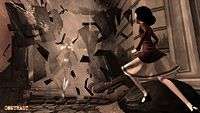 |
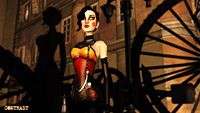 |
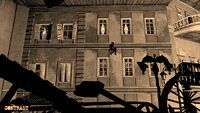 |
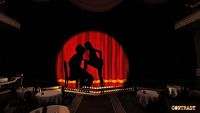 |
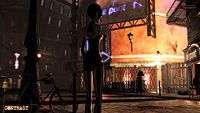 |
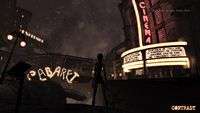 |
These jumps worked because, frankly, the controls don’t work as well as you’d hope. The 2D jumping is often too fiddly, and you’ll be redoing jumps over and over because you either overshot the platform or didn’t jump just far enough. This becomes particularly frustrating during the game’s thankfully few timed puzzles, where you’ll have to jump out of the wall, reset the puzzle, and start over again and again to get an object that it later transpires you didn’t really need. Worse yet, shifting between dimensions frequently resulted in me getting stuck, particularly in corners, where I would be left floating and unable to do anything unless I shifted back into the wall.
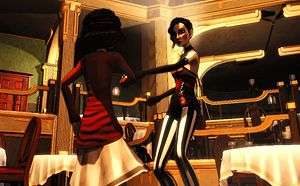 Also disappointing is the lack of variety in the puzzles available. You’ll either be rescaling the shadows cast by objects or carrying small objects, particularly crates and balls, and putting them down in the right place. Occasionally you’ll be invited to adjust a torch to light up a certain object, but the object you need to light up is so painfully obvious that to call this a puzzle would be an insult to puzzles. Carrying objects is especially annoying since they have a habit of getting stuck in places, or getting shoved out of the shadow world and back into the real world because of a slight movement in the shadow.
Also disappointing is the lack of variety in the puzzles available. You’ll either be rescaling the shadows cast by objects or carrying small objects, particularly crates and balls, and putting them down in the right place. Occasionally you’ll be invited to adjust a torch to light up a certain object, but the object you need to light up is so painfully obvious that to call this a puzzle would be an insult to puzzles. Carrying objects is especially annoying since they have a habit of getting stuck in places, or getting shoved out of the shadow world and back into the real world because of a slight movement in the shadow.
In one instance, a ball I was carrying fell out of my hands for seemingly no reason, rolled a short way, hit a moving shadow and then vanished from existence, forcing me to restart the entire chapter. These annoyances crop up again and again, and while you will eventually get the hang of the game’s issues and use them to your advantage, it’s still frustrating that you’re battling with the controller more often than you’re having a fun time.
This can be particularly annoying when you’re playing sections that relate to the story, as these looked to be the best parts of the game when I first saw it. Instead of the smooth shadow movements that subtly show you the place you need to stand next to progress, I found myself fighting with the cutscenes and being kicked out of the wall, sometimes to my certain death. There’s also not nearly enough of these scenes available to play, with the majority actually being earlier scenes placed later in the game and used as short puzzles to collect Luminaries, floating balls of light you need to collect to progress at certain points that are usually in such abundance that you rarely need to go too far out of your way to collect them. What could have been a great storytelling mechanic disappointingly falls to the wayside as another puzzle mechanic that just doesn’t quite work.
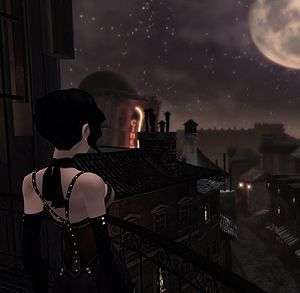 Graphically, Contrast isn’t the prettiest game around. Both Dawn and DiDi are quite blocky, and stylised in such a way that they just look bizarre; Dawn in particular appears to have legs that are far too long for her. The environment also suffers from looking far too square for its own good, and overall the whole thing looks a little dated. That said, the feel of the world is magnificent, and there’s a lot of really interesting ideas floating around. The world drops away into an endless void at certain points, and here the world starts breaking apart and crumbling, largely for gameplay purposes as obstacles to get across, but this could also be interpreted as the extent of DiDi’s imagination stopping the world from existing at certain points. The 1920s’ style remains strong and well-designed throughout, and the design of the environments are so gorgeous and charming its almost easy to forget the slightly dodgy execution of the whole thing.
Graphically, Contrast isn’t the prettiest game around. Both Dawn and DiDi are quite blocky, and stylised in such a way that they just look bizarre; Dawn in particular appears to have legs that are far too long for her. The environment also suffers from looking far too square for its own good, and overall the whole thing looks a little dated. That said, the feel of the world is magnificent, and there’s a lot of really interesting ideas floating around. The world drops away into an endless void at certain points, and here the world starts breaking apart and crumbling, largely for gameplay purposes as obstacles to get across, but this could also be interpreted as the extent of DiDi’s imagination stopping the world from existing at certain points. The 1920s’ style remains strong and well-designed throughout, and the design of the environments are so gorgeous and charming its almost easy to forget the slightly dodgy execution of the whole thing.
Fitting with the era, the game features a jazz soundtrack… or at least, I think it does. What little music there is in the game does fit the world and is a joy to listen to, and there is a key scene with Kat early on that features one particularly spectacular musical number complete with shadowy music video, but beyond that there aren’t any memorable sounds to write home about. I’m sure there is a soundtrack in the game somewhere, but I mostly remember running around in silence between levels. The voice acting, on the other hand, is superb. DiDi’s performance is a little shaky, until you realised that she is in fact voiced by a young girl who presumably has little experience voice acting, bringing a whole different level of charm to her character, particularly as she struggles to come to terms with some relatively mature concepts. The adult characters are fantastically voiced across the board; Jimmy is particularly convincing, and his character’s writing and voice combine wonderfully to create a lovely character who you initially feel a little off about, before finally coming around to his side and cheering him on. If it weren’t for the talented cast, the great writing would’ve been a waste, so it’s great to see the two working so well together.
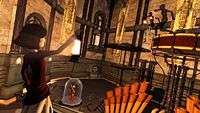 |
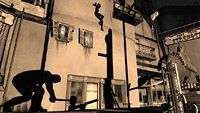 |
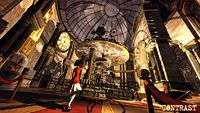 |
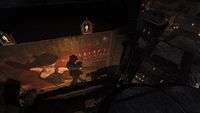 |
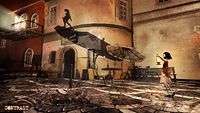 |
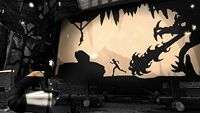 |
But, like the shadows that you play with in-game, Contrast disappears almost as quickly as it arrived. The promised four-to-five hours of gameplay ends up being more around the three hour mark, with an additional fifteen minutes to clear up the collectibles. It doesn’t outstay its welcome by any means, and by the end you’ll be happy that it doesn’t drag on any further, but it still feels like there could’ve been a bit more fun to be had in the world. Still, if you’re looking for a short, interesting story, then this is definitely the place to be.
I had a feeling in my gut from the moment I first saw this game that it wouldn’t be as amazing as I hoped. I could tell that the platforming, despite being a novel idea, wouldn’t quite work. I could see that the graphics weren’t going to match up with the high quality most people expect these days. But what I was not prepared for was quite how taken in with the story and the world I would become. I spent so long exploring every nook and cranny, desperately trying to squeeze more out of the story and the world, to hear the cast speak once more, and to absorb the ‘20s feel into my very being. It’s flawed, for certain, but there’s still plenty in here to enjoy, and, if you’re willing to battle with some dodgy controls, a magnificent story that you’ll remember for quite some time.
Pros- Well-written with a truly enthralling story
- Wonderful environment design and general ‘20s feel
- Fantastic voice acting across the board
- Platforming is often frustrating and fiddly
- Lacking in variety of puzzles
- Not enough jazz
If you’re looking for a great puzzle-platformer with interesting mechanics that handles well, then you’re in the wrong place. What Contrast can offer you is a magnificent story that can’t quite keep its tone straight, with a wonderful cast and a gorgeously designed world that you’ll want to stand around and just soak in. It’s not the best looking game, and the soundtrack drops out so often that you’re mostly sitting in silence, but it’s still so charming and wonderful that you’ll be willing to let the problems alone and just enjoy what is there. It’s not going to be for everyone, but for those looking for a great, if short, story, then this is the game for you.
Last five articles by Ric
- Playing Rhiannon, With Rhiannon
- The Hidden Controversies of 2015
- Best of 2015: Tell No Tales
- Best of 2015: A Good Walk Spoiled By John
- Best of 2015: My Summer As A Drug Dealer

















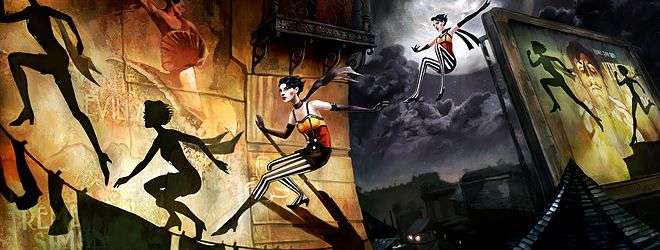
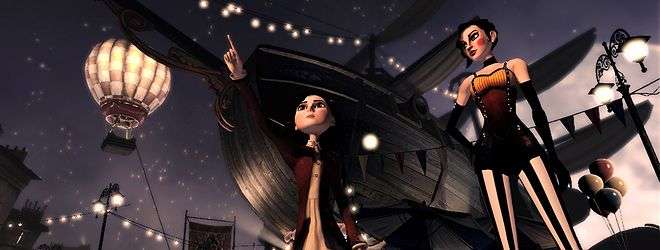






Good review, Ric. I agree with it entirely.
I really enjoyed the game too, despite the odd flaw, but it was so short it almost felt like a Walking Dead game episode.